QuestionHi Tabby,
Our first cat, Hobbes passed away just over a year ago. He was a male Tabby we found when he had his paws against the glass looking into a relative's house during a freezing, snowing Christmas. We were in the country with just one other house down the road and those people had not been home for about 3 days. So we saved him and our vet said he was about one year old. He was a very affectionate cat. He only became upset when I (mom) had to go back to work and he was at home all day and he was mad at me. So we got him a companion after about 1 or 2 years.
The cat we got was a Birman male who we named Calvin. Calvin worshipped Hobbes from the beginning and Hobbes eventually got to love his little new buddy. They became pretty inseperable. Calvin was always grooming hobbes and always wanting to sleep snuggled with Hobbes. But it was clear Hobbes was the Alpha male cat.
Calvin was always well behaved and just liked to playfully bite our toes in the morning, and we thought it was so cute that he couldn't really meow. When he would it would come out like a little "peep". Hobbes fell ill quite quickly when he was about 14 years old. His kidneys were failing and during this time Calvin was very sensitive to his needs and knew when to give him space, or even would stay away to give Hobbes private time with us.
Today, Hobbes has been gone for just over a year and a half. Calvin anxiously looked around for Hobbes and meowed and looked at us anxiously and frustrated that Hobbes was gone and why weren't we looking for him. He all of a sudden had a very loud yowl/meow/scream and obviously felt completely lost without his Hobbes. He now cries quite often, many times at night and it seems like he is lost and he needs us to call him and follow our voices to find us. And it's usually when we just get into bed at night.
He has resorted to licking my face and then nipping at my cheek, nose and chewing on my hands and the bites are more aggressive all the time. He now purposely knocks things off tables, or keeps jumping on our dresser and using his paws to scratch a mirror above it. He won't jump down until you actually get out of bed and walk toward him. We eventually have to lock him out of the bedroom because he won't stop biting/licking me or for his own safety. We hate to do this because he cries and we hate leaving him by himself. Both cats are/were indoor cats.
We don't know what to do. He obviously misses Hobbes enormously. But we don't know if getting another cat is the answer because Calvin is about 13 and we don't know how he'd react to another cat. We think a cat from a shelter that specifically is described as "needs to be around other cats". But what age should the new cat be? Or is getting a kitten good so that Calvin can care for it like a big brother. Any advice would be so helpful. We really want Calvin to be happy again. We know we are not enough. There are some things humans just can't provide.
Thank you so much
Cassandra
AnswerCassandra,
I would say that a lot of Calvin's behavior is age-related. Sometimes you can't tell because cat is familiar with things, but he may be blind. The cat relies on vibrations and noises to know where people are at. If you are in bed, there aren't any vibrations which causes the cat to get confused and cry.
Older cats can get a form of 'kitty Alzheimer's and can behave in a bizarre manner!
I would suggest taking him to a vet that specializes in geriatric cat care and conditions....not all vets do. And it's especially important at his age that he goes to a vet that knows what he is doing. He should have an "older cat checkup" to check the function of his thyroid, kidneys, and liver, and be checked for arthritis and/or pain. If he has any pain he can be given medication to make him comfortable thereby improving his quality of life.
Being prepared and knowledgeable about elderly cats will make things easier for the cat and for you. I am including some very good links about elderly cats. Copy and paste, or type, the whole links into your address bar:
http://www.sniksnak.com/resources/geriatric.html
http://www.messybeast.com/towards-end.htm
http://www.2ndchance.info/oldcat.htm
Sometimes getting a replacement cat helps, sometimes it doesn't. It depends on the personality and temperament of the cat. Older cats also do not take stress as well as a younger cat, and are not as accepting of changes in the household. It is iffy whether your 13 year old will accept or even want a cat or kitten around. He may just be needy and confused in which case he is demanding more and more of your attention.
A kitten may not a good choice as a companion for an 13 year old cat. You have a cat that is approximately 68 years old (in human years) and you are getting it a 5-10 year old (in human years) friend. Sometimes it is better to adopt a cat similar in age and temperament. Though he may surprise you, most older cats do not like kittens, at least until they are grown. Maybe it is their smell or their energy level.
If you want to get a kitten, it is better that you get two of them. That way they can play with each other and not always be bothering the older cat to play. A kitten's energy level is not the same as an older cat's and that's not fair to the kitten who will not understand why your older cat doesn't want to play all the time. As the kitten grows and gets more secure and self-confident it may intensify it's annoying behavior towards your older cat out of boredom or to expend energy. That may cause the older cat to become stressed or cause behavior problems (like inappropriate elimination). Or it can cause the older cat to be aggressive towards the younger cat out of frustration. Just some things to consider.
With a kitten or cat you will need to go through the introduction process with the 13 year old. With an older cat it may take longer. Usually for younger cats it takes about 2 weeks, with an older cat it can take a month or more. Again, everything depends on the personalities and temperaments involved. Hissing, spitting, and slaps are normal kitty communication. You only need to worry if there are ears pinned back flat, blood being shed, or major fur flying. Also keep your cats claws trimmed so there aren't any deadly points.
Here are some good links for more information:
(copy and paste or type the whole links into your address bar)
Here is a good article about cats grieving:
http://www.messybeast.com/cat-grief.htm
Information on introducing cats to older cats:
http://www.messybeast.com/Oldcat.htm#addition
http://www.understandinganimals.com/article/7
http://www.messybeast.com/first-impressions.htm
http://www.parmashelter.org/adoption/advice/cats/old_cat_new_cat.htm
You may want to try another cat, but if it REALLY upsets Calvin after the correct introduction process I would rehome it. I hope it works out.
Tabbi

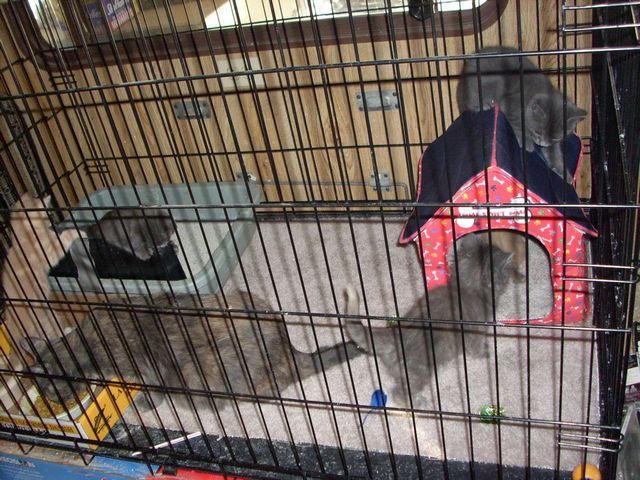 introducing my cat
QuestionHi, Me and my kitty moved in with my boyfriend
introducing my cat
QuestionHi, Me and my kitty moved in with my boyfriend
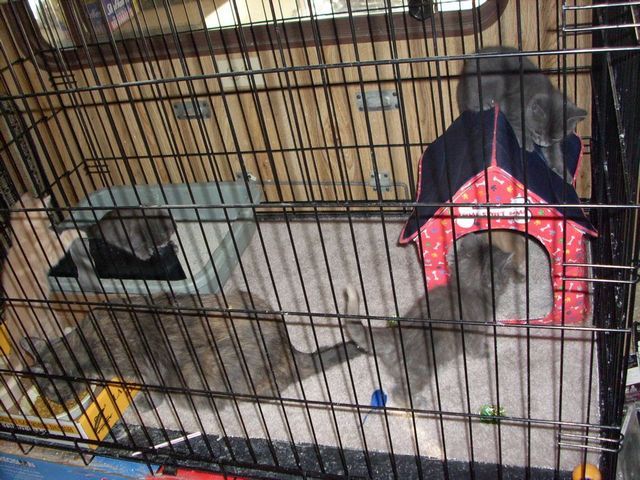 Aggressive new cat
QuestionDear Tabbi,
We have rescued many c
Aggressive new cat
QuestionDear Tabbi,
We have rescued many c
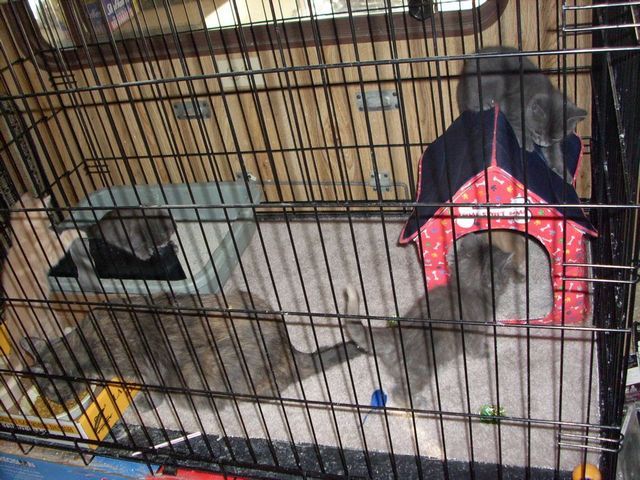 My cat liked my dogs but hates the new kitten
QuestionHi,
I have a 3 year ol
My cat liked my dogs but hates the new kitten
QuestionHi,
I have a 3 year ol
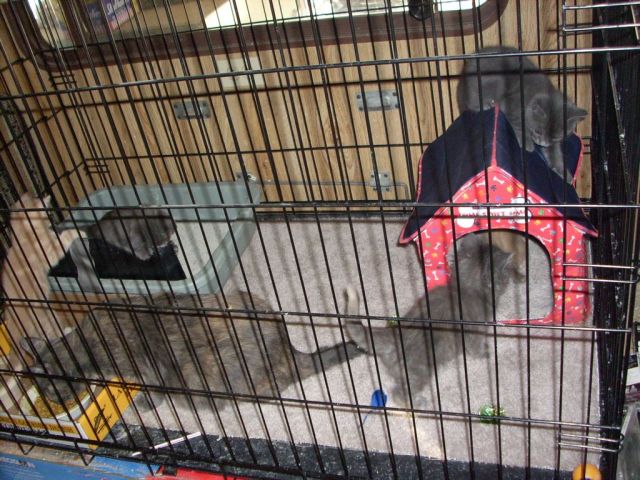 New cat...
QuestionWe brought home a new 5 month old male kitten w
New cat...
QuestionWe brought home a new 5 month old male kitten w
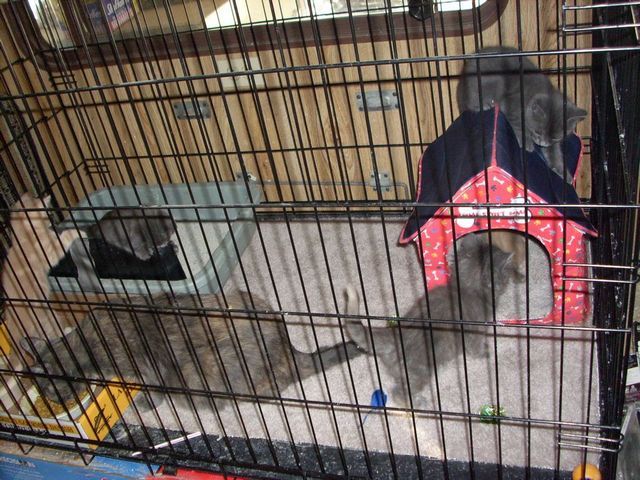 help me understand please!
Questionhow can i make my 5 month old male kitten and m
help me understand please!
Questionhow can i make my 5 month old male kitten and m